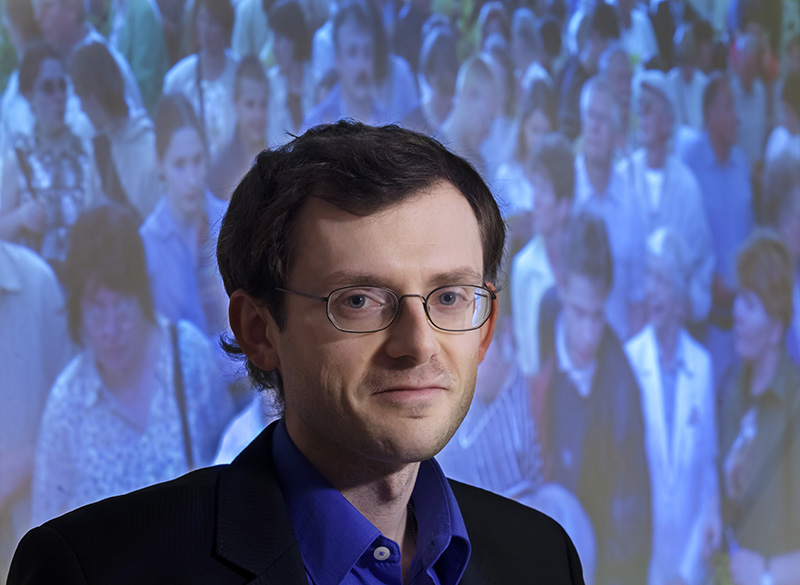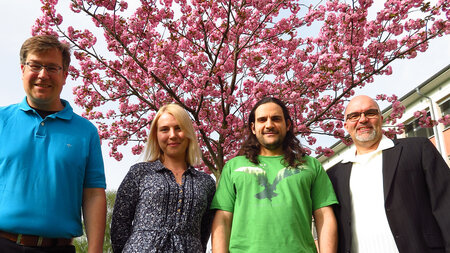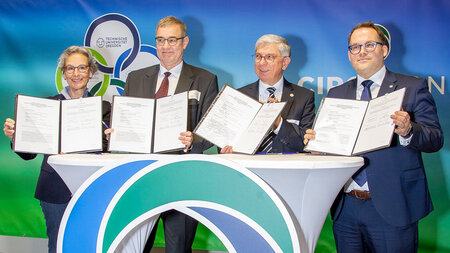Health outcomes and their risk factors
Eleven questions for Junior Professor Dr. Patrick Brzoska, who is the holder of the Junior Professorship of Epidemiology since October 2014
-

"Epidemiology examines the distribution of health incidents and their influencing factors in the population", describes Jun.-Prof. Dr. Patrick Brzoska his special field. Photo: Uwe Meinhold
Junior Professor Dr. Patrick Brzoska (31) holds the Junior Professorship of Epidemiology at the Faculty of Behavioural and Social Sciences since October 2014. In eleven answers, he gives the readers of “University News“ an insight into his career, goals and time in Chemnitz.
What do we actually understand under ‘epidemiology’?
Epidemiology is a methodological core discipline of public health and examines the distribution of health incidents and their influencing factors in the population – in contrast to medicine which deals with the health problems of individuals. Health incidents are often referred to as “outcomes“ in epidemiology. They comprise, for instance, illness, death or recovery. Factors of influence – epidemiology usually speaks of “exposures“ – include health behaviors such as smoking and physical activity, or environmental factors such as dust and noise.
TU Chemnitz is for me as a junior professor the right choice, because…
…it, among other things, adopted interdisciplinarity and an international approach, both of which are important requirements for public health. The reason is that the health of populations is increasingly affected by global trends and factors. To preserve and promote public health, an international perspective and cooperation between different fields of science are indispensable.
Could you say a few words about your academic career?
I graduated from Bielefeld University with a master and doctoral degree in public health. During my studies I was employed as a student assistant and thereafter as a research associate at the Faculty of Health Sciences at Bielefeld University. My research and teaching predominantly focused on epidemiology, international public health and health services research. Teaching and research stays multiple times led me to research institutes and universities abroad, including India, Turkey and the United States.
Describe your study time in about 15 words.
Interdisciplinary, diverse, stressful, communicative, intense, research-oriented, insightful, great, labor-intensive, multifaceted, expedient, challenging, amusing, informative, friendly
Did you have role models during your studies, who encouraged you to pursue a scientific career?
During my studies and time spent abroad, I worked with many people including my thesis supervisor who all inspired me to pursue a research career.
What advice would you give to young students and graduates?
Fun and interest in the subject are essential for a successful completion of a study program. It is also important to think about career perspectives as early as possible in order to seek specialization and further education already during university studies. Universal and interdisciplinary skills, for instance, with respect to foreign languages, should be kept in mind as well. The wide range of services at the university helps to acquire respective skills. Students should also take the opportunity of studying abroad, which can be a great asset in both professional and cultural life.
What would you like to achieve in teaching for the future?
In teaching, I would like to show students the importance of epidemiology and public health on both a theoretical and methodological level. Through the combination of research and practice, I also intent to demonstrate the diverse career prospects that students of epidemiology and public health can expect. Furthermore, promoting students’ skills is of great relevance for me, for instance, with regard to academic reading and to writing for different audiences, both of which are important for their studies and subsequent careers.
Which impact do you make in research at TU Chemnitz?
In research, my interests comprise social and health services epidemiology, among other things. I study the difference of various population groups with respect to their health and health behavior as well as to the access and quality of the health care services they receive. Doing so, I contribute to the identification of the mechanisms involved in the development of inequalities in health, health care utilization and health care outcomes. This aims to derive strategies for the improvement of the health of the entire population.
There are around 45,000 professors at German universities. What sets you apart from others?
This should be judged by others :).
Which place in Chemnitz do you show to your guests?
I moved only recently to Chemnitz, which is why I like being shown around by others who live here for much longer than me. In my own winter sightseeing program, I had included the Christmas Market, which my guests and I enjoyed very much.
How do you play a part in the life of the city?
Given my recent relocation, as of yet, I encourage people who live elsewhere to visit Chemnitz and to get a picture of its charm themselves.
Further information about professorship at: https://www.tu-chemnitz.de/hsw/soziologie/Professuren/Epidemiologie
Katharina Thehos
17.02.2015





